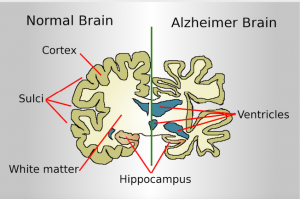Alzheimer’s Prevention: What Can You Do?
As people get older, there is a worry that loved ones may develop Alzheimer’s disease. Alzheimer’s is the most common type of dementia that can have a massive impact on a person’s health and quality of life. The disease kills brain cells and eventually takes lives. While Alzheimer’s disease prevention is still in the early days of research, healthy habits may help ward off cognitive decline.
What is Alzheimer’s Disease?
More than six million Americans have Alzheimer’s. It’s estimated that 12.7 million people over the age of 65 will have Alzheimer’s by 2050. With the world getting older, the number of people getting Alzheimer’s is likely to increase without the development of Alzheimer’s prevention or treatments.
Alzheimer’s is a brain disorder. It slowly destroys thinking and memory skills, making the simplest of tasks extremely difficult and sometimes impossible. The progressive disease means that symptoms worsen over time as the brain starts to shrink and brain cells begin to die.
Scientists believe that Alzheimer’s is caused by a combination of risk factors, including:
-
Age
-
Genetics
-
Gender
-
Mental activity
-
Environment
-
Medical conditions
There is still a lot of mystery surrounding Alzheimer’s disease, and the precise cause is relatively unknown. The combination of age-related changes in the brain, environment, and lifestyle factors are thought to be the most significant when talking about reducing the risk of developing Alezihmer’s.
What are the Symptoms of Alzheimer’s?
In most cases, symptoms start to occur in the mid-sixties for those with late-onset Alzheimer’s. But, you can begin to experience symptoms as early as thirty with early-onset Alzheimer’s. Symptoms of Alzheimer’s can range in severity, starting with:
-
Memory loss
-
Poor judgment
-
Wandering and getting lost
-
Changes in mood and personality
-
Shortened attention span
-
Struggling to learn new things
-
Difficulty reading and writing
Severe symptoms of Alzheimer’s can include:
Alzheimer’s Prevention: Lead a Healthy Lifestyle
So, what do we know about Alzheimer’s prevention so far? Scientists continue to conduct studies into ways to prevent Alzheimer’s, but so far, nothing has been completely proven. Because the precise cause of Alzheimer’s remains a mystery, there are no guidelines to reduce the risk of developing the disease. However, living a healthy lifestyle and taking steps to reduce age-related cognitive decline could help.
Physical Activity
A substantial body of evidence suggests that individuals with cardiovascular disease (CVD) are at a higher risk of developing Alzheimer’s. So, by reducing your risk of CVD, you may be able to lower your chances of Alzheimer’s. Regular exercise may help to ward off the condition or slow the progress, according to some studies. Aim for thirty minutes of moderate aerobic exercise three to four times per week.
Diet
A diet rich in fruits, vegetables, and lean protein promotes your overall health. One diet which looks promising is the Mediterranean diet. While research shows that people on this type of diet may be less likely to get Alzheimer’s, it’s unclear which part of the diet is beneficial. Typically, a Mediterranean diet includes:
-
Fruits and vegetables (spinach, cauliflower, bananas, oranges)
-
Nuts, seeds, and legumes (walnuts, hazelnuts, and flaxseeds)
-
Low in dairy, meat, and eggs
-
Moderate fish consumption (sardines, mackerel, tuna)
-
High in unsaturated fats (olive oil and seed oils)
Overall, the foods missing from a Mediterranean diet are added sugar, red meat, refined oils and grains, and processed foods. Researchers speculate that making healthy food choices may improve blood sugar and cholesterol. Although you don’t know the precise way, a Mediterranean diet may help; nevertheless, eating a well-balanced, healthy diet is essential for your physical and mental health.
Another interesting area of Alzheimer’s prevention and diet is omega 3. There is strong evidence that fish is good for your health. Fish like salmon, cod, and herring contain omega 3 fatty acids. Omega 3 is important for brain health, learning, and early cognitive development. Initial research into omega 3 supplementation shows that it may be useful in improving symptoms early on in Alzheimer’s. The problem is that there is a lack of consistent evidence to support a single nutrient therapy. But, currently, the strongest evidence in support of a single supplement points towards omega 3 fatty acids for preventing cognitive decline in Alzheimer’s.
Control Blood Pressure
Controlling high blood pressure may help prevent or slow Alezihmer’s progress. Initial research suggests a link between high blood pressure and Alzheimer’s. While the precise link is still being uncovered, it’s beneficial for your health to control high blood pressure in the long run.
While scientists continue to research medicines and lifestyle factors like mental exercises, stress reduction, and sleep, more research is needed into Alzheimer’s prevention. But taking steps to promote your overall health can’t hurt in the meantime. Maintaining a healthy weight, regular exercise, and a balanced diet can help to combat conditions such as obesity, heart disease, and diabetes. As studies continue, developing healthy habits now could put you in a better position for the future.
Join Our Community
Archives
- January 2023
- December 2022
- September 2022
- August 2022
- June 2022
- May 2022
- April 2022
- March 2022
- February 2022
- January 2022
- December 2021
- November 2021
- October 2021
- September 2021
- August 2021
- July 2021
- June 2021
- May 2021
- March 2021
- September 2020
- August 2020
- July 2020
- June 2020
- May 2020
- April 2020
- March 2020
- February 2020
Subscribe

Sign up to receive FREE toolkit
From Dr. Hyman, #1 NY Times & Amazon Author
We never spam or sell your e-mail








Follow Our Every Move